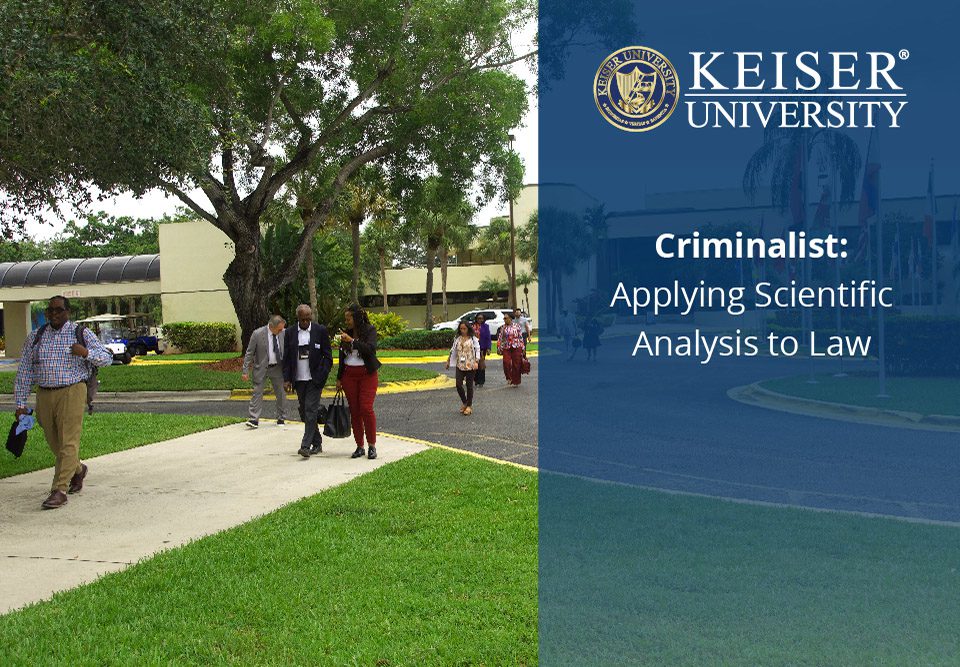As technology in forensic science and related fields continues to advance, the need for knowledgeable and skilled criminalists also evolves. Across the country, law enforcement agencies and crime labs rely on criminalists to collect, process and analyze physical crime scene evidence in the pursuit of justice for criminals.
If you are interested in getting into a career in criminal justice that is less focused on law enforcement and more focused on solving crimes, then a career as a criminalist could be right for you. So, what exactly does a criminalist do, and how do you get into this challenging yet fulfilling line of work? This article highlights one of the many branch’s graduates can consider—especially those seeking certification or field-based forensic work.
What Is a Criminalist?
Specifically, a criminalist is a type of forensic scientist responsible for carrying out criminalistic examination and analysis of physical evidence from a crime scene. The Master’s in Criminal Justice program at Keiser University Graduate School focuses on policy-oriented curriculum. Criminalist roles, discussed in this article, typically require additional specialized scientific training in addition to the curriculum taught in the criminal justice program.
The Role of a Criminalist in the Justice System
Criminalists play a critical role in the criminal justice system, particularly as it relates to solving crimes. By carefully analyzing evidence, working with law enforcement and preparing reports, criminalists can help prosecutors successfully convict individuals who commit any number of crimes. Without the hard work of criminalists in our justice system, it would be difficult (if not impossible, in some cases) to solve some crimes or achieve criminal convictions.
Difference Between a Criminalist and a Forensic Scientist
While the terms “criminalist” and “forensic scientist” are sometimes used interchangeably, it is important to understand that the two job titles are not totally synonymous. The Master’s in Criminal Justice at Keiser University Graduate School prepares professionals to shape the future of justice through influencing policy, reforming institutions, and leading law enforcement with integrity and purpose. Criminalists are a subset of the broader forensic science field. Meanwhile, the field of forensic science encompasses not just criminalistics, but other specializations that include:
- Pathology
- Odontology
- Toxicology
- Ballistics
The Science Behind Criminalistics
Now that we have established that criminalistics is a part of the overarching forensic science field, we can dive deeper into the science behind it all.
How Criminalists Use Scientific Analysis to Solve Crimes
A crucial aspect of any criminalist’s job is to use scientific analysis to solve crimes, which can be done by collecting and processing physical evidence found at a crime scene. Often, analysis is done in testing labs using such methods as DNA profiling, toxicology, chemical analysis and other techniques to link or rule out suspects involved in a case.
Key Forensic Disciplines in Criminalistics
Within the field of criminalistics, there are some key forensic disciplines that these professionals should have experience with, including DNA analysis, ballistics/firearms identification, toxicology and digital forensics.
DNA Analysis
Criminalists may be able to collect DNA samples from blood, saliva or other bodily fluids found at a crime scene. This DNA can then be analyzed to establish or rule out links between suspects and the crimes in question.
Fingerprint Examination
In some cases, it may be possible to lift fingerprint evidence from a crime scene for further analysis in a lab setting. Identifying a fingerprint match makes it possible to link a suspect to a specific crime scene or even a weapon used in the crime.
Ballistics and Firearms Identification
Criminalists may also use firearm and ballistic analysis to link shell casings or other projectiles to a specific firearm. This, in conjunction with other evidence, could be enough to make a conviction.
Toxicology
Meanwhile, criminalists can also use toxicology to identify substances (such as drugs and alcohol) in physical evidence samples. This can be used to determine whether a particular substance may have played a role in the execution of a crime.
Digital Forensics
Increasingly often, criminalists are now using digital forensics from computers, phones and even social media to link potential suspects to crime scenes.
Importance of Chain of Custody in Evidence Handling
Another critical part of working as a criminalist is knowing how to follow the chain of custody when it comes to evidence handling. These policies and procedures are in place to ensure that evidence is handled properly to maintain its integrity and that evidence can be admitted for use in court.
Criminalists need to know how to properly document, label, store and transfer physical evidence per agency guidelines and industry-wide best practices.
How to Become a Criminalist
Does a career as a criminalist sound appealing to you? If so, then you may be wondering what it takes to break into this line of work.
Education Requirements
Typically, criminalists need a minimum of a bachelor’s degree in a related field, such as forensic science, chemistry, biology or criminal justice. For more advanced roles (including leadership and supervisory roles), a master’s degree or even a doctorate degree may be required. A Doctor of Criminal Justice, Master of Arts in Criminal Justice or similar graduate-level degree can be a great way to explore career advancement opportunities.
Certifications and Specialized Training
Within the field of criminalistics, there are also some additional certifications and designations you can pursue to advance your career and build your skills. You might consider, for example, pursuing Crime Scene Investigation (CSI) certification through the International Association for Identification (IAI) or additional certifications in:
- Toxicology
- Odontology
- Forensic document examination
- Firearms/ballistics
Essential Skills and Qualifications for Criminalists
In addition to having a solid background in criminal justice and forensic analysis, criminalists must also be extremely detail-oriented, especially when processing crime scenes for physical evidence. Criminalists also need to have strong critical thinking and problem-solving skills while communicating and collaborating with other professionals in the field.
Career Opportunities in Criminalistics
There are plenty of different career paths in the criminalistics field and potential advancement opportunities worth exploring.
Work Environments for Criminalists
The work setting for a criminalist can vary based on the specific role and job description. However, some of the most common work environments in this field include:
- Crime labs
- Law enforcement agencies
- Federal government agencies (such as the FBI, DEA and ATF)
- Private forensic firms
Salary Expectations and Job Outlook
Pay for a criminalist can also vary greatly depending on your level of experience, education and other factors. According to the Bureau of Labor Statistics (BLS), the median annual wage for forensic science technicians (including criminalists) in 2023 was $64,940 per year. Meanwhile, the job outlook for these professionals is projected to grow 14 percent between 2023 and 2033.
Advancement Opportunities in Criminalistics
The most common way to advance within the field of criminalistics is to specialize in a certain area of the field, such as DNA analysis or ballistics. However, those with strong leadership skills may also have the opportunity to move into supervisory or managerial roles, such as forensic science manager or lab director. There is also the option to teach criminalistics or forensic science for those interested, although these types of roles typically require a more advanced degree.
Frequently Asked Questions (FAQ)
Explore answers to some of the most commonly asked questions about a career as a criminalist or criminal scientist below.
What is the difference between a forensic scientist and a criminalist?
There is some overlap between criminalistics and forensic science in the sense that criminalistics is a specialty within the broader discipline of forensic science. In comparing the two, however, criminalistics is more centered around the analysis of physical evidence retrieved from a crime scene, whereas forensic science is a broad field that encompasses any scientific methods used to solve a crime.
What education do I need to become a criminalist?
While education and training/experience requirements can vary from one job posting to the next, most criminalists will need a minimum of a bachelor’s degree in forensic science, chemistry, biology, criminal justice or a related field to enter the field. For those pursuing career advancement within the field, an advanced degree (such as a master’s or even a doctoral degree) may be preferred.
What is the job outlook for criminalists?
The BLS states that the job outlook for forensic science technicians (which includes criminalists) is projected to grow 14 percent between 2023 and 2033 alone, which is much faster than the average for all occupations.
What types of evidence do criminalists analyze?
Criminalists are responsible for analyzing any and all physical evidence from a crime scene. This can include ballistics evidence, trace evidence and even forensic evidence.
What are the biggest challenges in the field of criminalistics?
Professionals working in criminalistics face many challenges in their work, including staff shortages and a lack of resources. In many cases, poor staffing can lead to criminalists being overworked and backlogged, which can also result in delays processing evidence or solving crimes.
Ready to Learn More?
Working as a criminalist certainly comes with its inherent challenges, but for those serious about applying their critical thinking, analytics and problem-solving skills to make a difference in the world of criminal justice, it can be extremely rewarding work.
Eager to take the next step on your journey to a career in criminology or criminal justice? Keiser University is proud to offer a number of criminal-justice-related graduate programs, including:
- Master of Arts in Criminal Justice, Interdisciplinary Studies (MACJ IS)
- Master of Arts in Criminal Justice (MACJ)
- Doctorate of Criminal Justice (DJC)
- Doctor of Philosophy in Criminal Justice
Get in touch with a Keiser University graduate admissions counselor today to learn more about any of these programs, or take the next step by starting your online application for admission.






 The instructors at Keiser University impacted my life. They believed in my ability to become a great graphic designer, regardless of how I felt about my skills. KU helped to prepare me for the real world and got me to where I am today.
The instructors at Keiser University impacted my life. They believed in my ability to become a great graphic designer, regardless of how I felt about my skills. KU helped to prepare me for the real world and got me to where I am today.
